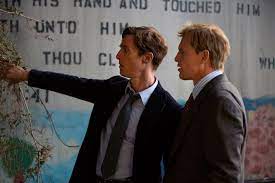The last time I was a member of a search committee for a new tenure track faculty member in my department, I found the response to the college’s mission statement (required of all semifinalist candidates) to be particularly interesting. The candidate wrote that “A dear friend and colleague with whom I shared an office for many years once confided in me that he could hardly believe that I was really religious, for I seemed like such a reasonable man. ‘And religious belief, as we know, is a kind of pathological state. Religion is good for children, as a means to reinforce morals; but in adults, belief in God is a sign of psychological disorder.’”
In keeping with the often haphazard workings of my brain, I was immediately reminded of an episode from the first season of HBO’s “True Detective” (the fourth season of the ‘True Detective” is currently streaming). The first season is set in southern Louisiana, near the Texas border. Marty Hart (played by Woody Harrelson) and Rust Cohle (played by Matthew McConaughey) are detective partners, but could not be more different. Hart has a well-developed “good ole boy” persona which masks a number of personal quirks and demons that are slowly being revealed, while Cohle wears his intelligence, pessimism and misanthropy on his sleeve.
Their pursuit of a serial and ritualistic killer brings them to a tent revival meeting, where from the back they observe and discuss a gathering of a hundred or so believers held in rapt attention by the preacher at the front.
Rust: What do you think the average IQ of this group is?
Marty: Can you see Texas up there on your high horse? What do you know about these people?
Rust: Just observation and deduction. I see a propensity for obesity, poverty, a yen for fairy tales. Folks putting what bucks they do have into a wicker basket being passed around. Safe to say nobody here’s going to be splitting the atom, Marty.
Marty: See that? Your fuckin’ attitude. Not everybody wants to sit around in an empty room and get off on murder manuals. Some folks enjoy community, the common good.
Rust: If the common good’s got to make up fairy tales, it’s not good for anybody.
Marty: Can you imagine if people didn’t believe, the things they would get up to?
Rust: The same things they do now, just out in the open.
Marty: Bullshit. It would be a fucking freak show of murder and debauchery, and you know it.
Rust: If the only thing keeping a person decent is the expectation of divine reward, then brother that person is a piece of shit. And I’d like to get as many of them out in the open as possible.
Marty: I guess your judgment is infallible, piece of shit wise. Do you think your notebook is a stone tablet?
Rust: What’s it say about a life that you got to get together, tell yourself stories that violate every law of the universe just to get through the goddamn day. What’s that say about your reality, Marty? Certain linguistic anthropologists think that religion is a language virus that rewrites pathways in the brain and dulls critical thinking.
Marty: I don’t use ten-dollar words as much as you, but for someone who sees no point in existence, you sure fret about it an awful lot. And you still sound panicked.
In one short sequence, Hart and Cohle get to the core of religious belief. Is it an “opiate of the masses,” a haven for shallow thinking individuals who seek comfort, community, and an escape from their lousy lives, perhaps the most dependable firewall against a state of nature that would, as Thomas Hobbes put it, be “solitary, poor, nasty, brutish, and short”? Or is it something else altogether? There is a lot of food for thought in this brief exchange. It sure beats the hell out of the “Gilligan’s Island” and “Bonanza” of my youth.
I have been asked occasionally by religious folk how I can be both a person of faith and a philosopher; more recently I have been asked the same question by a non-believer or two. But no matter who is asking the question, the assumptions remain the same—reason and faith don’t naturally go together. The job applicant’s office mate and Rust Cohle both assume that common sense and clear thinking rule out what is presumed to be at the heart of all religious belief. Such belief does an end run on the hard work of grappling with how things actually are, replacing such work with wishful thinking and unsubstantiated hopes.
Is there any place for hope in the life of a thinking, rational person? Is it ever legitimate to hope for and believe in something that cannot be fully substantiated with a combination of past experience coupled with facts and data that are presently available? This is perhaps the central theme of most everything I’ve written over the years in this blog, and while its importance to me has not diminished, neither have I come to any settled or formulaic answers. I recently, against my better judgment, participated briefly in a Facebook conversation in which one person challenged anyone to provide “one single, solid piece of evidence that he or she has ever had an encounter with God.” It was very clear from the context of this challenge and the previous discussion that this person was defining “evidence” very narrowly—something tangible and objective that everyone could agree upon.
The evidence that grounds my faith is not of that sort. I continually rely on the definition of faith from the Book of Hebrews, which says that “Faith is the substance of things hoped for, the evidence of things not seen.” What do I hope for? That there is a meaning to it all, that underneath the apparent chaos and meaninglessness of reality there is a vein of purpose that can be mined. Dorothy Allison puts it well:
There is a place where we are always alone with our own mortality, where we must simply have something greater than ourselves to hold onto—God or history or politics or literature or a belief in the healing power of love, or even righteous anger. Sometimes I think they are all the same. A reason to believe, a way to take the world by the throat and insist that there is more to this life than we have ever imagined.
My faith gives substance to this hope by encouraging me to accept as “evidence” in support of the meaning and purpose I hope for all sorts of things—experiences, intuitions, feelings—that do not fit neatly within the very narrow definition of “evidence” that the Rust Cohle’s of the world insist upon. No better expression of an expanded openness to the abundant evidence related to hope has ever been written than in Shakespeare’s Hamlet. When Horatio has difficulty believing that the ghost of Hamlet’s father is real, Hamlet replies that “there are more things in heaven and earth, Horatio, than are dreamed of in your philosophy.” And to misquote another famous line, faith “is like a box of chocolates. You never know what you are going to get.”
In the end, the best evidence to support hopeful thinking is a changed life. An encounter with the divine often can only be communicated on a “come and see” basis. In John 9, a formerly blind man whose vision has been restored by Jesus finds himself being grilled by the Pharisee authorities. Who did this? How did he do it? Don’t you know that we have already concluded that this Jesus person is a sinner? The man simply responds “Whether He is a sinner or not I do not know. One thing I know: that though I was blind, now I see.” Experience trumps fact every time.













